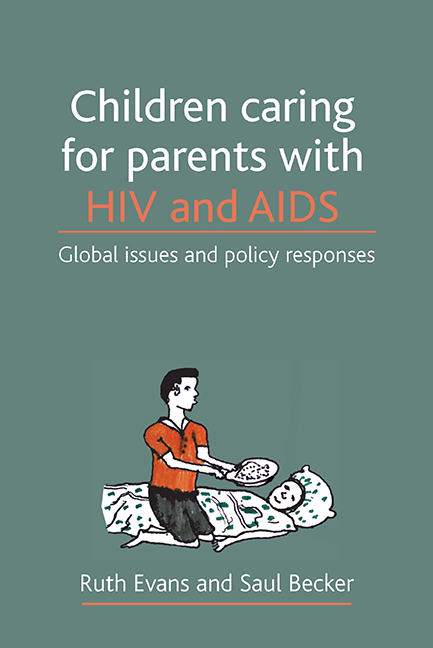Book contents
- Frontmatter
- Dedication
- Contents
- List of tables, figures and boxes
- Preface
- one Children’s and young people’s caring responsibilities within the family
- two HIV and the family
- three Reflexivity, methodology and ethics: the research process
- four Living with HIV and the effects on family life: parents’ narratives
- five Children’s and young people’s care work in households affected by HIV and AIDS
- six Resilience and impacts of care work for individual young people and their families
- seven Resilience and impacts of young people’s care work within the school and wider community
- eight The role of formal safety nets in building children’s and families’ resilience
- nine Global and local processes influencing young people’s caring roles in families affected by HIV and AIDS
- ten Responding to the support needs of children and young people caring for parents with HIV
- Bibliography
- Index
nine - Global and local processes influencing young people’s caring roles in families affected by HIV and AIDS
Published online by Cambridge University Press: 21 January 2022
- Frontmatter
- Dedication
- Contents
- List of tables, figures and boxes
- Preface
- one Children’s and young people’s caring responsibilities within the family
- two HIV and the family
- three Reflexivity, methodology and ethics: the research process
- four Living with HIV and the effects on family life: parents’ narratives
- five Children’s and young people’s care work in households affected by HIV and AIDS
- six Resilience and impacts of care work for individual young people and their families
- seven Resilience and impacts of young people’s care work within the school and wider community
- eight The role of formal safety nets in building children’s and families’ resilience
- nine Global and local processes influencing young people’s caring roles in families affected by HIV and AIDS
- ten Responding to the support needs of children and young people caring for parents with HIV
- Bibliography
- Index
Summary
Despite the growing body of research on young carers, only a few studies have theorised the factors influencing whether and why children become carers for family members with physical impairments, mental illness or chronic or life-limiting illnesses. However, since the 1990s, Becker's research with his colleagues on young carers in the UK and other European countries has shown that the reasons why a particular child becomes a carer within any family will be complex and will vary from household to household and from situation to situation. Building on the analyses of previous studies on young carers in both the North and South, this chapter explores the processes and factors that influence whether and why young people take on caring responsibilities in families affected by HIV/AIDS. We explore the perspectives of young people, parents/relatives and service providers on the factors and changes in family life that led to the commencement of young people's caring trajectories within families in Tanzania and the UK. Based on our analyses in previous chapters and the global literature on young caregiving and HIV/AIDS, we also analyse the wider structural and relational aspects that affect the socioeconomic, cultural and policy context of young caregiving at the global, national and local levels.
Individual, relational and structural processes shaping young people's involvement in care work
The experiences of children and parents in households affected by HIV/AIDS discussed in the previous chapters suggest that a complex range of structural, relational and individual processes shape the context in which young caregiving takes place. Becker et al's (1998) analytic framework of the factors that ‘push’ or ‘pull’ some children into unpaid caring roles in a household include the nature of the illness/disability, family structure, gender and co-residence, status and power, and the availability and nature of external support. Developing this framework, the different processes and factors influencing whether and why children take on caring roles in families affected by HIV/AIDS can be conceptualised as a nexus comprising the different levels of individual children, the family and household, community, sociocultural and national policy context and global processes and policy environment (see Figure 9.1).
The structural, relational and individual processes within the nexus represent both risk and protective factors for children living in households affected by HIV/AIDS.
- Type
- Chapter
- Information
- Children Caring for Parents with HIV and AIDSGlobal Issues and Policy Responses, pp. 227 - 268Publisher: Bristol University PressPrint publication year: 2009



